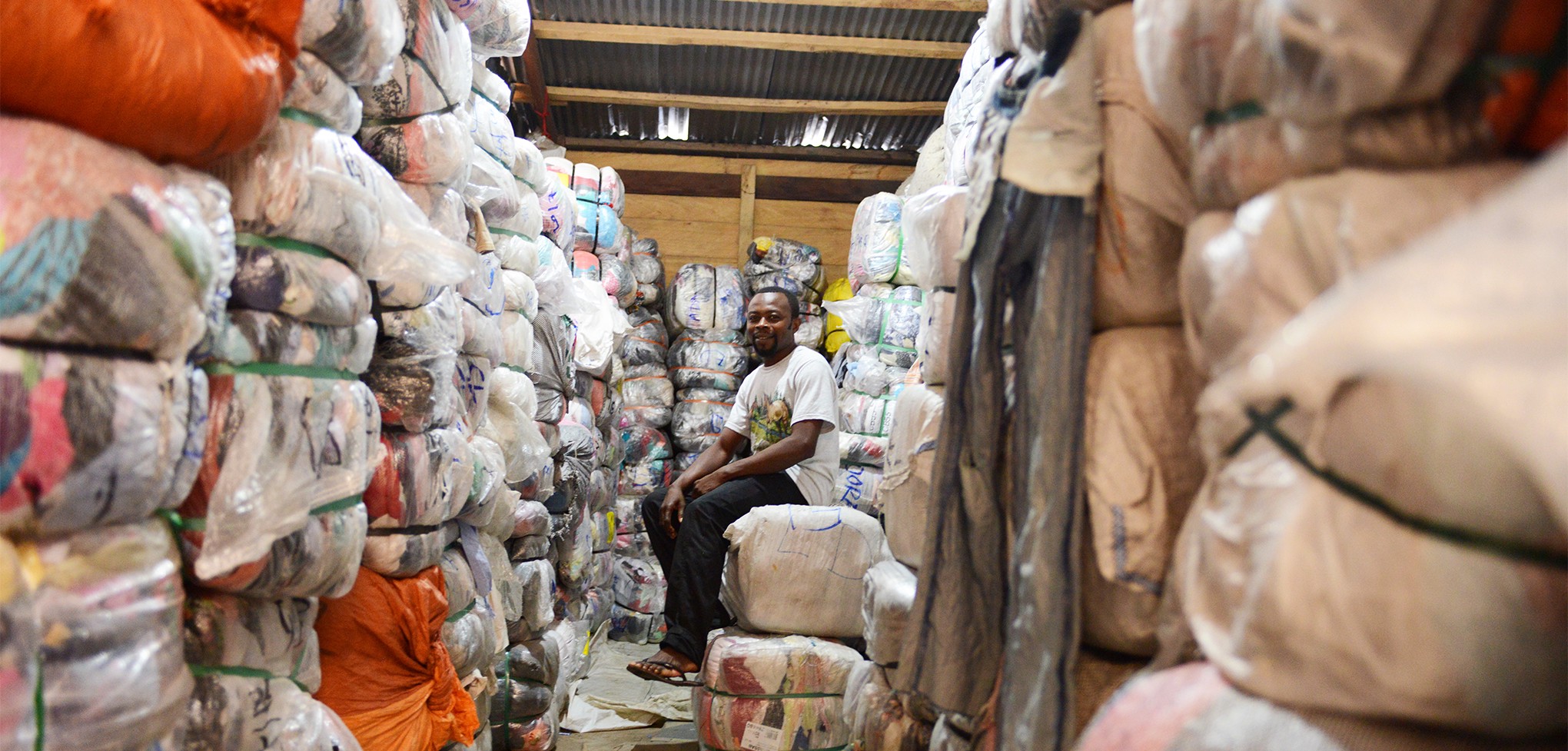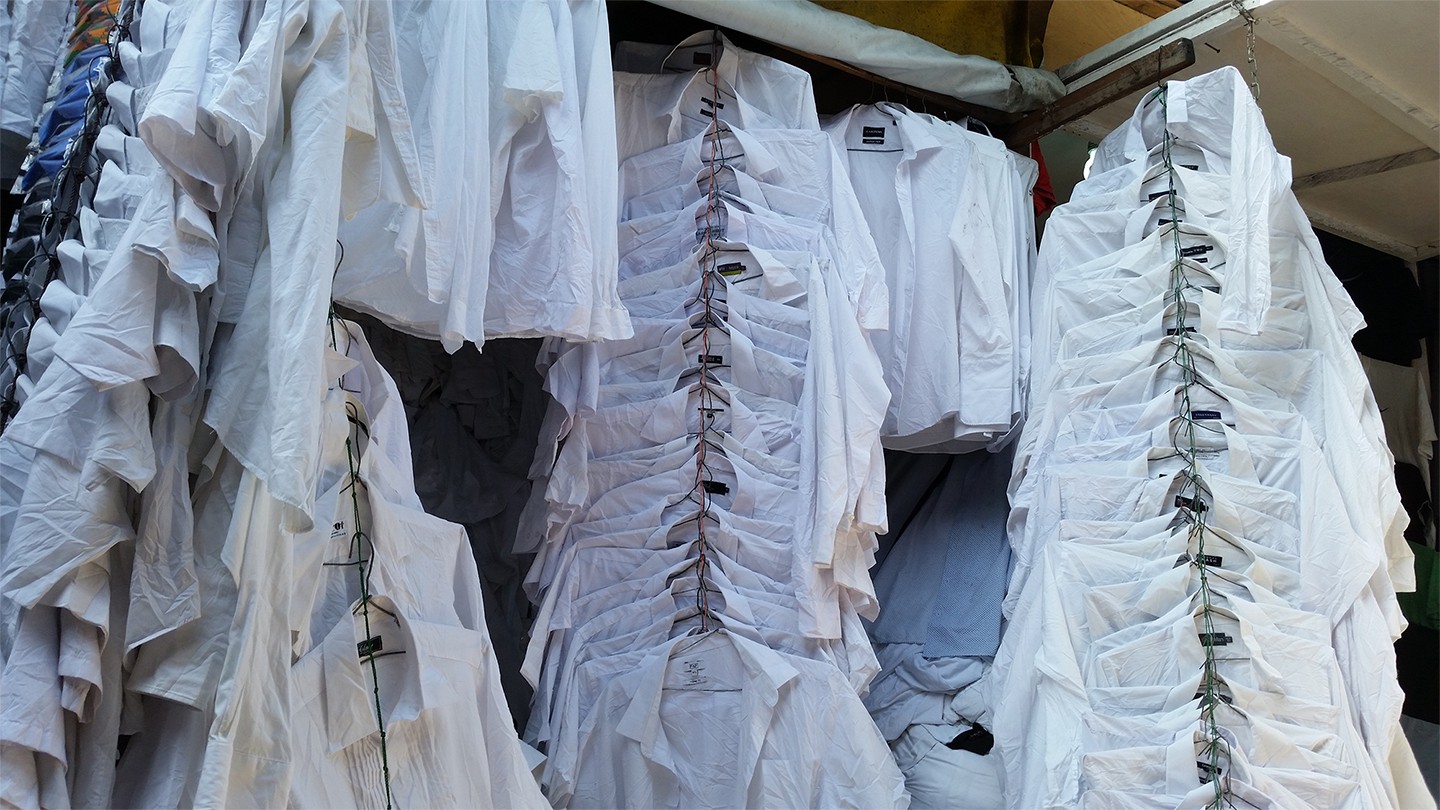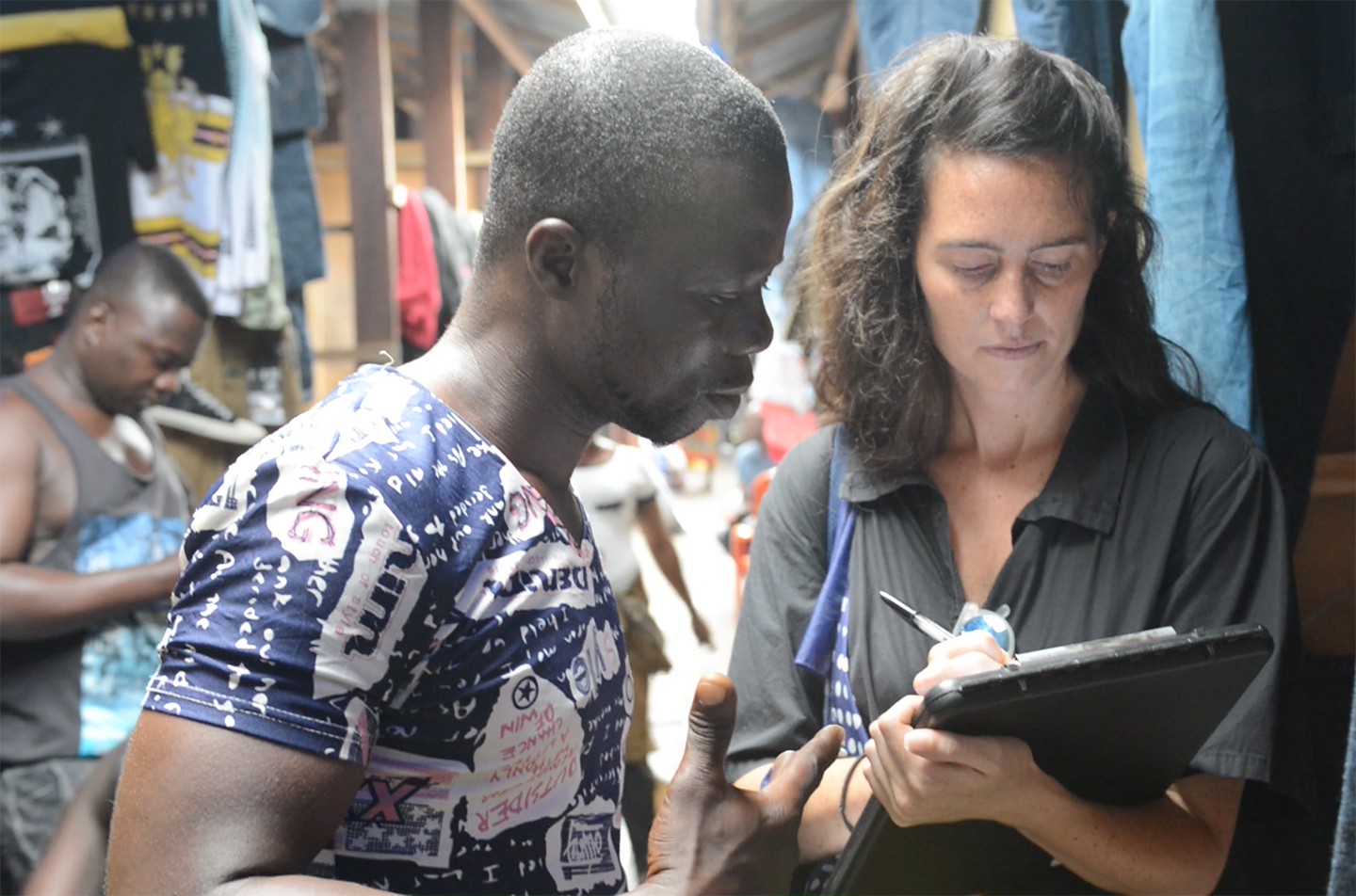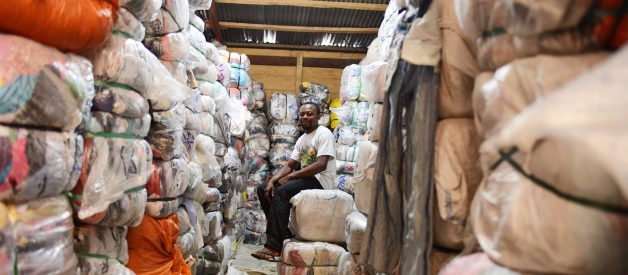 Man sitting among bales of donated clothes in Ghana -photo The OR Foundation
Man sitting among bales of donated clothes in Ghana -photo The OR Foundation
Just moved to New York City? Or back in with your parents? Or maybe trying the KonMari method or becoming a minimalist? Or like me, just really liked the idea of only having pieces that you really enjoy wearing in your wardrobe. Whatever the reason, if you have bags of unwanted clothes that you?re about to drop off at the local thrift store or in a bin on the street please hold that thought for a moment.
 Me ?back in the day? in a vintage faux fur
Me ?back in the day? in a vintage faux fur
First, let me say there is nothing wrong with thrift stores. When I was a teenager I used to love the excitement of discovery and finding the unexpected. ?my favorites being Men?s striped satin pajama sets that I would buy and wear as separates ? usually with Doc Marten combat boots and a v-neck men?s cashmere cardigan with elbow patches ? also second hand. But to be honest it?s now been a long time since I?ve heard the siren song of the Salvation Army. Still that didn?t stop me from bundling up all my own used clothes once or twice a year and dropping them off at the local thrift store ? and mentally patting myself on the back for not just tossing them in the trash.
I thought this was the best solution until I stumbled across ?Dead White Man?s Clothes?. Not the name of a punk band, but an exhibit created by J Branson Skinner and Liz Ricketts of The OR Foundation that traces the journey our discards take from our homes to West Africa. The vast majority of clothing donations gets bundled and shipped to places like Ghana to be sold in their market. This is hardly unsurprising when you realize more than 3.8 billion pounds of clothing are donated in the U.S. each year, the equivalent of 166,000 t-shirts donated every single minute.*
In Ghana our old clothing is called Obroni Wawu and it translates to ?the white man has died clothes? or ?the foreigner has died? clothes. Ghanaians started calling it that because in the ?50s when they first started getting our exported clothes they assumed someone had died. It was unimaginable that someone would just get rid of clothing that still had wear. Fast forward 70 years and they?ve imported, along with or perhaps because of, fast fashion, our Western ethos of excess and disposability.
 A stall devoted exclusively to white shirts
A stall devoted exclusively to white shirts
The exhibit Dead White Man?s Clothes looks at the unintended consequences of our donations. Consequences like:
- 17 million secondhand items arriving each week in Accra creating a supply that outweighs the demand.
- Much of our discarded items contributing to their local landfills.
- Women working as porters in the market who are often victims of debt-slavery
- The ubiquitousness of our cast offs has nearly destroyed the local textile industry.
 Liz Ricketts talking to a trader in the marketplace
Liz Ricketts talking to a trader in the marketplace
Liz pointed out to me the rather bitter irony that historically Accra was a main point of exit for people who were enslaved coming directly to the US and now it is the main point of entry for most of our used stuff: not just clothing but also cars, electronics, and e-waste. Add to that the history of colonialism and how we?re transitioning from pure extraction of resources in these places to now dumping our waste on them only magnifies the situation.
One could read this as ?donations are bad? but it is far more complex than that. This market for our clothing also employs over 30,000 people and, for better or worse, is a central part of the economy. It?s unrealistic to think that it will (or should) stop. But, it can be improved if we are more careful about what we donate. If it?s stained, torn, too worn out or of poor quality don?t donate it. My litmus test is ?Is it in a condition that I would feel okay to give it to a friend?? If not, I?m not giving it away at all because it increases the chance of it being put in some other countries landfill.
Now you?re thinking ?That?s great. But now what should I do with all my stuff?? First take time to actually go through it and separate it out by quality, where it was bought and what type of clothing (i.e. denim, formal wear etc) In the U.S., retailers including Patagonia, H&M, The North Face, and Eileen Fisher have implemented in-store recycling and take-back programs ? check which of your items can be returned to a store. More options beyond thrift stores below.
It really boils down to this: that all life is interrelated. We are all caught in an inescapable network of mutuality, tied into a single garment of destiny. Whatever affects one destiny, affects all indirectly. ? Dr. Martin Luther King, Jr
I?ve updated this list as of July 2020
Dye It Black Love a certain item of clothing but it?s stained or faded? You could try the old RIT Dye solution or better yet send it to Dye It Black who will dye it for you professionally for as little as $15 for a simple cami and $25 for jeans.
Blue Jeans Go GreenLike the name says, this is denim only. Currently partnering with Zappos they will send you a box to send in your old jeans for free!
Nike ReUse-A-ShoeUp to 10 pairs of sneakers ? of any brand can be dropped off at participating Nike stores.
Brides Across AmericaYour donated wedding dress will go to a military bride.
New Eyes for the NeedyEyeglass will be dispensed to people in developing nations or recycled to raise funds for new eyeglasses.
Free The Girls Bra Donation They?ll accept ?gently used? bras and work to empower women who have been freed from sex trafficking.
CONSIGNMENT STORESDifferent than thrift stores because they only take what they?ll sell and you get a percentage. Check local and online. Some of my favorites are
INA and The RealReal
But there?s also Poshmark and Tradesy
RECYCLINGIf you have items that really are too worn or stained to wear consider textile recycling options.
Re-fashion NYC will set up bins in your apartment building that will take used items and thrift what they can and recycle the rest
Council for Textile Recycling Find clothing donation drop-offs and textile recycling resources all across the US.
Wearable Collections NYC-based clothing recycling pick up service -also offers bins for apartments.
Grow NYC Often at farmer?s markets, it?s an easy way to drop off clean clothes/textiles. They will recycle as best as they can.
Secondary Materials and Recycled Textiles An online platform that will help you find the nearest textile recycling outlets near you.
? ? ? ? ? ? ? ? ? ?
Buy Nothing A unique organization with local community groups that allow you to list what you have available for free.
Finally now that you?ve cleared out your closet, try to buy less stuff. Seriously. And buy better. Fast fashion is killing our planet in so many ways that I literally gag when I hear someone say that it?s ?all they can afford?. That?s like saying you eat at McDonald?s because it?s all you can afford. Am I saying that there aren?t people who truly can?t afford more expensive clothes? Of course not. I?m saying that in my social world fast fashion is a choice not a necessity. (and chances are if you?re reading this fast fashion isn?t your only option either.) Trying to be ethically and environmentally responsible is a challenge and an imperfect science but small efforts help.
- stat from Elizabeth L Cline
- This was originally published on No Kill Magazine


